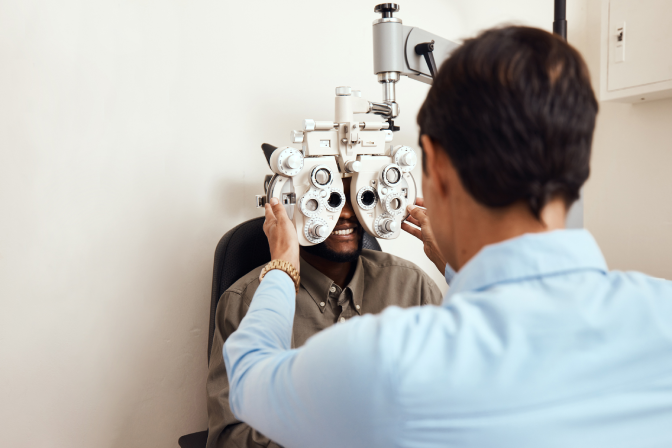Buy one pair of eyeglasses, get a second pair 50% off!
*Restrictions apply. Click here for details.

Clarkson Eyecare is staffed with highly skilled eye doctors who use the latest technology to help evaluate and treat ocular emergencies. Emergency eye care may be required for patients who are experiencing acute, painful, or debilitating eye conditions, including eye injuries. The Clarkson Eyecare optometrists have the experience, skills, and specialized knowledge in emergency eye care, and they can help administer testing and treatment for a variety of eye care emergencies.
Find Emergency Eye Care at a Clarkson Eyecare Near You

At Clarkson Eyecare, our goal is to provide every patient with the best emergency eye care possible. We are located in Florida, Georgia, Illinois, Kentucky, Michigan, Minnesota, Missouri, New Jersey, Ohio, and Virginia. Click to find a location near you.
What Is an Eye Care Emergency?
An eye care emergency is defined as the sudden onset of symptoms or eye trauma that affects a person’s vision. Eye emergencies can be a number of different things including but not limited to trauma to the eye, sudden vision loss, or chemical exposure.
Types of Eye Emergencies
The doctors at Clarkson Eyecare have a wide range of emergency eye care procedures and treatment methods that they can utilize to treat patients. Clarkson Eyecare recommends seeking immediate medical attention for pain, redness, or swelling of the eye to prevent further damage and permanent vision problems.
Bacterial & Viral Eye Infections
Certain eye infections like conjunctivitis can cause pain, redness, and swelling in the eyes and can be accompanied by discharge. Do not wear any contact lenses and schedule an appointment to be evaluated by a doctor as soon as possible, as eye infections can progress and develop into conditions that can threaten your vision. The optometrists at Clarkson Eyecare can properly diagnose eye infections and prescribe you the proper treatment.
Chemical Exposure to Eyes
Chemicals in your eye can cause permanent damage and scarring to the eye. If you believe your eyes have been exposed to chemicals, immediately flush the eyes with a saline solution or tap water for at least 15 minutes. Hold the head so that the injured eye is on the bottom and flush from the nose downward, so you do not accidentally flush chemicals into an unaffected eye. Then seek emergency eye care as soon as possible. Patients can help a doctor determine how serious the injury is by communicating the type of chemical they were exposed to, how concentrated it was, if it was an acid or base, and how long it has been since exposure.
Foreign Bodies in the Eye
Eye emergencies that involve foreign bodies in the eye can range from particles to large objects. Clarkson Eyecare recommends trying to blink the object clear or flush it out if it is a small object. If it is a large object or has penetrated the eye, you should avoid touching, applying pressure, or attempting to remove it, These can all cause serious injury to the eye. You should seek immediate medical assistance as soon as possible if an object cannot be cleared, is large or sharp, or if it has penetrated the eye.
Traumatic Eye Injuries
Traumatic eye injuries like scratches or punctures can be the result of a variety of conditions and incidents, commonly caused by accidents. If left untreated, trauma to the eye can lead to partial or permanent vision loss and should be treated immediately by an eye care specialist.
Clarkson Eyecare advises that patients experiencing traumatic eye injuries call for help right away and never attempt to remove any object that has penetrated the eye.
Sudden Changes or Loss in Vision
Noticeable and sudden vision changes or vision loss such as blurred or double vision or flashes of light can indicate that you are suffering from eye conditions such as retinal detachment, corneal defects, or other serious health issues like strokes and neurological damage. Symptoms such as blurred vision, flashing lights, and floating spots should be addressed by an eye specialist as quickly as possible.
Eye Diseases & Other Conditions
If you are experiencing new eye or vision problems and have been diagnosed with certain eye conditions or diseases, Clarkson Eyecare recommends scheduling an emergency eye appointment immediately. If you are experiencing noticeable or sudden eye symptoms with a family history of eye diseases, you should also seek urgent care to prevent irreversible eye damage from conditions like glaucoma.
Warning Signs of an Eye Care Emergency
Clarkson Eyecare recommends making an appointment immediately if you experience any sudden changes in vision or anything on the list below:
Burning or stinging
Divergent or unusual eye movements
Double vision
Sudden, blurred vision
Flashes of light
New or increased sensitivity to light
discharge or blood in the eyes,
Severe itching or swelling
Where to Go for Emergency Eye Care
If you are suffering from an eye emergency, seek medical care at an emergency room or an urgent care clinic. It is important to note these facilities may not specialize in eye care and may be unable to properly diagnose and treat certain eye conditions like retinal detachment.
The Clarkson Eyecare advises patients to seek immediate attention for eye emergencies at a location that is accessible and offers the best treatment options. Being evaluated by an eye specialist will most likely have the best outcome.
Schedule an Emergency Eye Appointment Today

If you are experiencing an ocular emergency, seek medical attention immediately. The doctors at Clarkson Eyecare can help patients suffering from traumatic and uncomfortable eye conditions that can cause vision loss if left untreated. If you are concerned about a change in your vision, call Clarkson Eyecare to schedule an emergency eye care appointment.
Frequently Asked Questions about Emergency Eye Care
Clarkson Eyecare recommends that patients contact their insurance providers in advance to learn about important coverage details for potential eye emergencies.
If you experience a sudden increase in eye floaters or spots in your vision, this may be an eye care emergency. Flashes and floaters can indicate retinal detachment or other serious health conditions.
Patients experiencing unusual or severe eye pain accompanied by fever, headache, light sensitivity, nausea, vomiting, or sudden vision changes should seek immediate medical care. Also, If there was a chemical exposure or foreign objects in the eye that cannot be cleared, and secretions of blood or other discharge from the eye should be treated as eye care emergencies.
